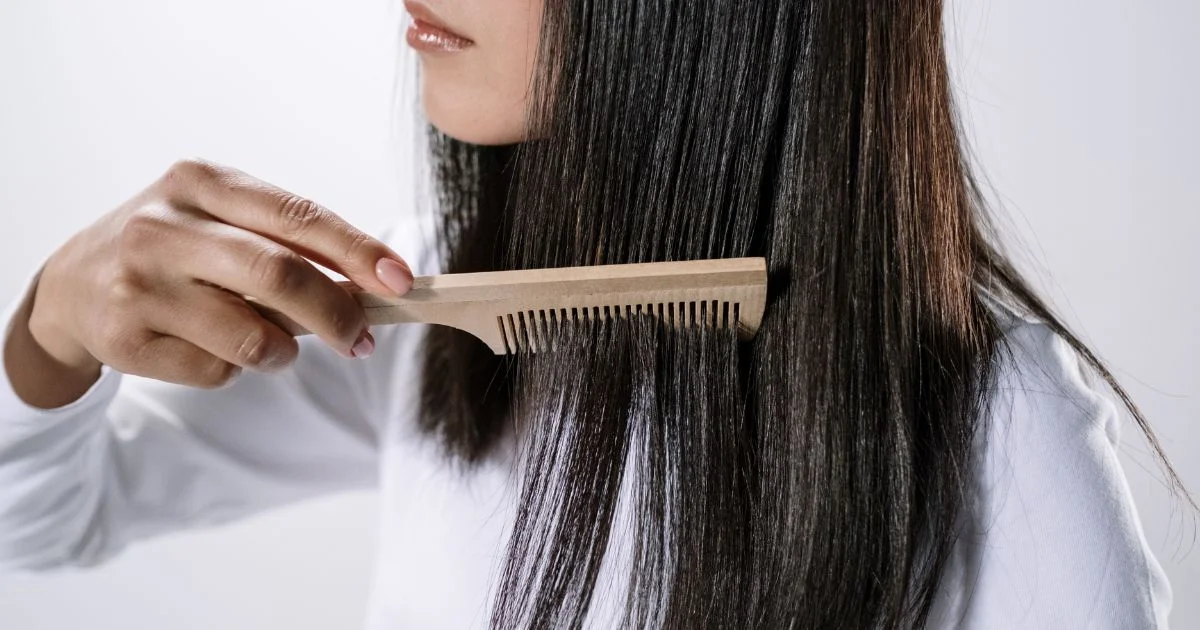Are you tired of constantly brushing off white flakes from your shoulders and scalp? Dandruff can be a pesky and embarrassing problem that affects many people. It can be caused by a variety of factors, including dry skin, oily skin, fungus, or even stress. Fortunately, there are numerous ways to combat dandruff and keep your scalp healthy and flake-free. In this article, we will discuss tips and remedies on how to get rid of dandruff for good healthy hair.

How Does Dandruff Develop?
Before diving into how to get rid of dandruff, it’s important to understand how it develops. Dandruff is essentially a buildup of dead skin cells on the scalp. When these cells become trapped on the scalp, they clump together and form visible flakes. This can be caused by a variety of factors, including:
• Oily skin
• Dry skin
• Fungal infections
• Hormonal imbalances
• Stress
• Certain hair products
• Genetics
Understanding the underlying cause of your dandruff can help you choose the best treatment method.
How to Get Rid of Dandruff: Home Remedies
There are several home remedies that you can try to banish dandruff. Here are a few of the most effective ones:
1. Tea Tree Oil
Tea tree oil has antifungal and antibacterial properties that can help combat dandruff. Mix a few drops of tea tree oil with a carrier oil like coconut oil, and massage it into your scalp. Leave it on for at least 30 minutes before washing it out. It will help you to get rid of dandruff.
2. Apple Cider Vinegar
Apple cider vinegar has acidic properties that can help balance the pH of your scalp and reduce dandruff. Mix equal parts apple cider vinegar and water, and apply it to your scalp after shampooing. Let it sit for a few minutes before rinsing it out.It will help you to get rid of dandruff.
3. Aloe Vera
Aloe vera has soothing and hydrating properties that can help relieve the symptoms of dandruff. Apply fresh aloe vera gel directly to your scalp, and leave it on for at least 30 minutes before washing it out.It will help you to get rid of dandruff.
4. Baking Soda
Baking soda has exfoliating properties that can help remove dead skin cells and reduce dandruff. Mix a tablespoon of baking soda with water to form a paste, and apply it to your scalp. Leave it on for a few minutes before rinsing it out.It will help you to get rid of dandruff.
How to Get Rid of Dandruff: Over-the-Counter Remedies
If home remedies don’t work, there are several over-the-counter remedies that you can try. Here are a few of the most effective ones:
1. Medicated Shampoos
Medicated shampoos contain active ingredients like salicylic acid, coal tar, or ketoconazole that can help combat dandruff. Look for shampoos that specifically target dandruff, and use them according to the instructions.This will help you to get rid of dandruff.
2. Topical Creams
Topical creams like corticosteroids or antifungal creams can also help reduce dandruff. Apply them directly to your scalp according to the instructions.It will help you to get rid of dandruff.
3. Prescription Medications
If your dandruff is severe, your doctor may prescribe oral medications like antifungal pills or corticosteroids to help alleviate the symptoms.This will help you to get rid of dandruff.
How to Prevent Dandruff
While there is no guaranteed way to prevent dandruff, there are several things you can do to reduce your risk. Here are a few tips:
1. Maintain Good Hygiene
Good hygiene is key to keeping your scalp healthy and preventing dandruff. Wash your hair regularly with a gentle shampoo, and avoid using hot water or harsh hair products that can irritate your scalp.
2. Keep Your Scalp Moisturized
Dry scalp can lead to dandruff, so it’s important to keep your scalp moisturized. Use a conditioner after shampooing, and consider using a leave-in conditioner or hair oil to keep your scalp hydrated.
3. Eat a Balanced Diet
A healthy diet can help keep your skin and scalp healthy. Make sure to eat a balanced diet that includes plenty of fruits, vegetables, and whole grains, and avoid processed foods and sugary snacks.
4. Manage Stress
Stress can worsen dandruff, so it’s important to manage your stress levels. Practice relaxation techniques like meditation, yoga, or deep breathing, and make sure to get enough sleep.
Read more.How to Make Thick Hair Less Poofy:10 Tips And Tricks How to Get Thicker Curls: 14 Tips and Tricks for Fuller, More Voluminous Hair How to Get Thicker Bangs: 6 Tips and Tricks for Fuller Hair How To Make Your Hair More Dense: 6 Tips and Tricks How to Make Thick Hair Thinner for Guys: 6 Tips and Tricks How To Go From Thin Hair To Thick Hair Naturally:8 Tips And Tricks How to Get Thick Black Hair Naturally: 11 Tips and Tricks for Healthy and Strong Hair 8 Best Tips and Tricks: How to Make Facial Hair Grow Thicker 15 Best hair care tips for hair loss
Conclusion:
Dandruff can be a frustrating and embarrassing problem, but it’s not impossible to get rid of. By maintaining good hygiene, keeping your scalp moisturized, and using the appropriate treatment method, you can banish flakes and keep your scalp healthy and dandruff-free. If your dandruff is severe or accompanied by other symptoms, it’s important to see a doctor to rule out any underlying conditions.
Remember, there is no one-size-fits-all solution for dandruff, so be patient and persistent in finding the best treatment method for your specific case. With a little effort and the right approach, you can say goodbye to dandruff and hello to healthy, flake-free hair.
FAQs
Is dandruff contagious?
No, dandruff is not contagious.
Can dandruff cause hair loss?
While dandruff itself does not cause hair loss, scratching your scalp excessively can damage your hair follicles and lead to hair loss.
Can dandruff be a sign of a more serious condition?
In rare cases, dandruff can be a sign of a more serious condition like seborrheic dermatitis or psoriasis. If your dandruff is severe or accompanied by other symptoms like redness, swelling, or itching, it's important to see a doctor.
How often should I wash my hair if I have dandruff?
Wash your hair regularly with a gentle shampoo, but avoid washing it too frequently as this can strip your scalp of its natural oils and make dandruff worse.
Can changing my diet help get rid of dandruff?
While there is no specific diet that can cure dandruff, eating a balanced diet that includes plenty of vitamins and minerals can help keep your scalp healthy and reduce your risk of dandruff.
Can dandruff come back after treatment?
Yes, dandruff can come back after treatment if the underlying cause is not addressed. It's important to maintain good hygiene and use the appropriate treatment method to prevent dandruff from recurring.



